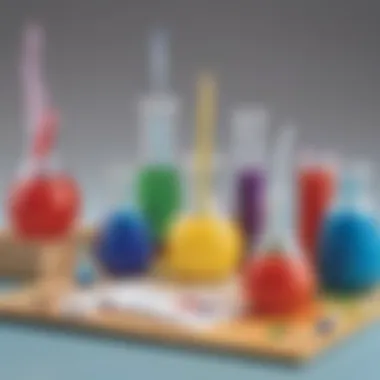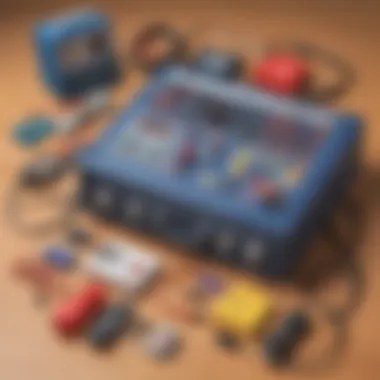Engage Young Minds with Enriching Science Experiment Kits for Elementary Schoolers


Creative Activities
Introduction to Science Experiment Kits
In this comprehensive guide to science experiment kits for elementary school children, we will delve into the world of interactive learning experiences aimed at nurturing a love for science. These kits encompass a range of activities from chemistry sets to physics experiments, designed to engage young learners, ignite their curiosity, and spark their creativity. By providing hands-on opportunities for exploration and discovery, science experiment kits offer a dynamic approach to learning that goes beyond theoretical knowledge and encourages practical application in a stimulating and enjoyable manner.
Understanding the Importance of Hands-On Learning
Enhancing Critical Thinking Skills
Hands-on learning plays a pivotal role in enhancing critical thinking skills among children. By actively engaging in experiments and scientific activities, students are prompted to analyze information, evaluate evidence, and draw logical conclusions. This process not only strengthens their problem-solving abilities but also cultivates a deeper understanding of scientific concepts through hands-on exploration. Critical thinking is a key component in the scientific method, and fostering this skill early on empowers children to think analytically and approach challenges with a rationale-based mindset.
Fostering Curiosity and Inquiry
Hands-on learning fosters curiosity and inquiry by allowing children to explore scientific concepts firsthand. Through interactive experiments, children are encouraged to ask questions, seek answers, and make connections between theory and practice. This hands-on approach not only nurtures a sense of curiosity but also instills a spirit of inquisitiveness that drives a lifelong interest in learning. By engaging directly with phenomena and observing outcomes, students develop a natural inclination towards exploration and discovery, laying a solid foundation for future scientific pursuits.
Encouraging Problem-Solving Abilities
Hands-on learning environments actively promote problem-solving abilities by presenting students with real-world challenges to overcome. Through experimentation and practical application of knowledge, children learn to approach problems methodically, test hypotheses, and adapt their strategies based on results. This experiential learning process enables students to develop resilience, creativity, and a systematic approach to problem-solving that will serve them not only in science but also in various facets of their academic and personal lives.


Choosing the Right Science Experiment Kit
In the realm of elementary school science education, selecting the appropriate science experiment kit holds paramount importance. The choice of the right kit can significantly impact a child's learning experience by providing hands-on engagement with scientific concepts. Through these kits, students can delve into the realms of chemistry, physics, biology, and earth science, fostering a deeper understanding of these subjects in a practical and engaging manner. By choosing the right science experiment kit, educators and parents can tailor activities to match the developmental stage and interests of the child, creating a rich learning environment that stimulates curiosity and analytical thinking.
Consideration Factors for Selecting a Kit
Age Appropriateness
When considering a science experiment kit, one of the critical factors to contemplate is its age appropriateness. Ensuring that the kit aligns with the child's developmental stage and cognitive abilities is essential for facilitating effective learning. Age-appropriate kits not only cater to the child's comprehension level but also present challenges that promote cognitive growth. By selecting a kit that matches the child's age, educators and parents can enhance the child's learning experience, creating a comfortable yet stimulating environment for scientific exploration.
Safety Features
Another crucial aspect to consider when choosing a science experiment kit is the presence of adequate safety features. Safety should always be a top priority, especially when engaging in hands-on experiments with young learners. Kits with clear safety guidelines, non-toxic materials, and age-appropriate tools help prevent accidents and ensure a secure learning environment. Prioritizing safety features not only safeguards the child's well-being but also instills good safety practices, fostering a culture of responsibility and awareness in scientific exploration.
Educational Value
The educational value of a science experiment kit is fundamental in nurturing a child's interest and understanding of science. Opting for kits that offer comprehensive educational content, align with curriculum standards, and encourage critical thinking can greatly benefit the child's learning journey. By selecting kits with substantial educational value, parents and educators can augment the child's knowledge base, instill a passion for scientific inquiry, and lay a solid foundation for future academic pursuits.
Incorporating Science Kits into Curriculum


In the realm of elementary education, embedding science experiment kits into curriculum is imperative to cultivate a hands-on learning environment that nurtures young minds. By seamlessly integrating these kits, educators harness the power of experiential learning to enhance students' comprehension and retention of scientific concepts. Furthermore, the utilization of science experiment kits in the curriculum serves as a catalyst for fostering a deeper appreciation for STEM subjects.
Integrating Hands-On Experiments in Lesson Plans
Alignment with Academic Standards
Understanding how science experiment kits align with academic standards is pivotal in promoting comprehensive learning experiences. By adhering to predetermined educational guidelines, these kits ensure that students receive a well-rounded exposure to fundamental scientific principles. The alignment with academic standards guarantees that the content covered is age-appropriate, relevant, and conducive to achieving learning objectives.
Supplementary Learning Opportunities
Supplementary learning opportunities provided by science experiment kits enrich the educational landscape by offering avenues for interdisciplinary connections. These opportunities extend beyond traditional textbooks, enabling students to explore real-world applications of scientific theories. Integrating supplementary learning materials stimulates critical thinking skills and encourages students to approach problems with a multidisciplinary perspective.
Encouraging Exploration and Discovery
Experiential Learning Benefits
The benefits of experiential learning through science experiment kits are unparalleled in fostering a practical understanding of scientific phenomena. By engaging in hands-on experiments, students actively participate in the scientific method, enhancing their problem-solving abilities and analytical skills. Experiential learning instills a sense of curiosity and discovery that inspires lifelong learners.
Cross-Disciplinary Connections


Exploring cross-disciplinary connections through science kits broadens students' perspectives by illustrating the interconnectedness of various scientific fields. By integrating concepts from multiple disciplines, students develop a holistic understanding of complex phenomena. Cross-disciplinary connections encourage students to think critically and creatively, preparing them for the challenges of a rapidly evolving technological landscape.
Promoting a Love for Science
Inspiring Future Innovators
Inspiring future innovators through science experiment kits ignites a passion for scientific inquiry and discovery. By showcasing the practical applications of scientific principles, these kits motivate students to explore and experiment beyond the confines of the classroom. Inspiring future innovators nurtures an entrepreneurial spirit and cultivates a generation of thinkers poised to tackle global challenges through innovation.
Nurturing Scientific Thinking
Nurturing scientific thinking through hands-on experiments instills a methodical approach to problem-solving and inquiry. By immersing students in scientific practices, educators cultivate a mindset grounded in evidence-based reasoning and logical deduction. Nurturing scientific thinking fosters resilience in the face of failure and instills a lifelong appreciation for the process of scientific discovery.
Conclusion
In concluding our exploration of Science Experiment Kits for Elementary School Children, it becomes evident that these kits serve as crucial tools in cultivating a deep-seated passion for scientific inquiry from a tender age. By engaging students in hands-on experiments, these kits go beyond theoretical concepts to instill practical knowledge and problem-solving skills essential for future success in STEM fields. Moreover, the interactive nature of these kits enhances student engagement and motivation levels, making learning a delightful and immersive experience. Parents and educators recognize the significance of incorporating such kits into the educational curriculum, as they nurture curiosity, critical thinking, and scientific aptitude in children.
Embracing the Exciting World of Science through Experimentation
Empowering Young Minds
Empowering Young Minds within the realm of Science Experiment Kits imparts invaluable skills and knowledge that are instrumental in shaping the future of young learners. By allowing children to explore and experiment independently, these kits foster a sense of self-reliance and confidence. The key characteristic of Empowering Young Minds through science kits lies in encouraging autonomy and creativity, enabling children to develop problem-solving abilities and analytical thinking at an early stage. This approach not only instills a sense of accomplishment but also hones resilience and adaptability, essential traits in navigating the complexities of the modern world. Despite some challenges in supervision and safety, the overall advantages of Empowering Young Minds through science experiment kits outweigh the minor drawbacks, as it equips children with essential life skills and lays a strong foundation for future academic pursuits.
Fueling a Passion for Discovery
Fueling a Passion for Discovery through Science Experiment Kits plays a pivotal role in igniting a lifelong enthusiasm for scientific exploration. By encouraging children to ask questions, seek answers, and experiment with diverse scientific principles, these kits spark curiosity and fuel a thirst for knowledge. The hallmark of Fueling a Passion for Discovery is its ability to nurture inquisitiveness and innovation, driving children to push boundaries and uncover the mysteries of the natural world. This approach not only cultivates a keen interest in science but also cultivates resilience in the face of challenges, promoting a growth mindset and a relentless pursuit of excellence. While there may be occasional setbacks in terms of resource management and scalability, the benefits of Fueling a Passion for Discovery through science kits are manifold, offering children a transformative educational experience that shapes their outlook towards learning and discovery.







